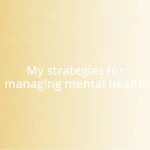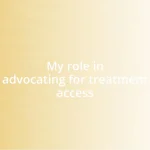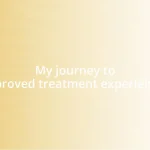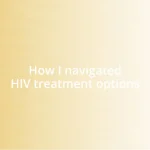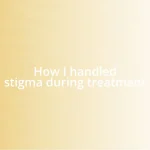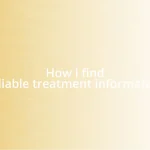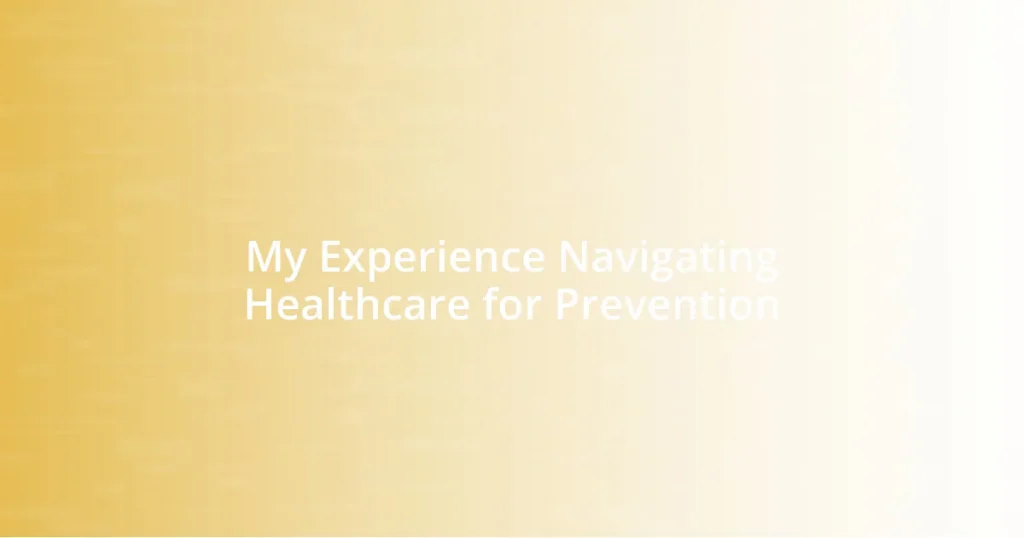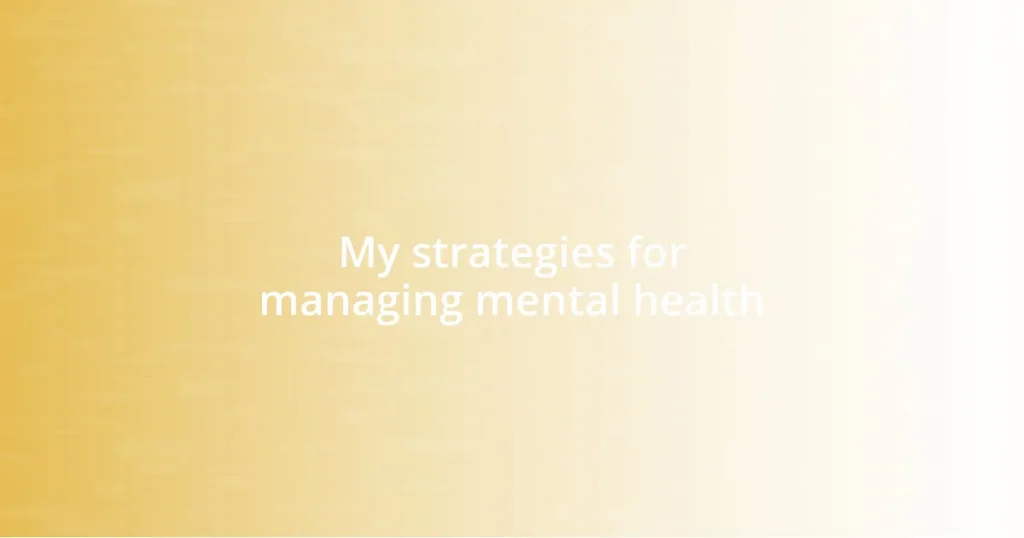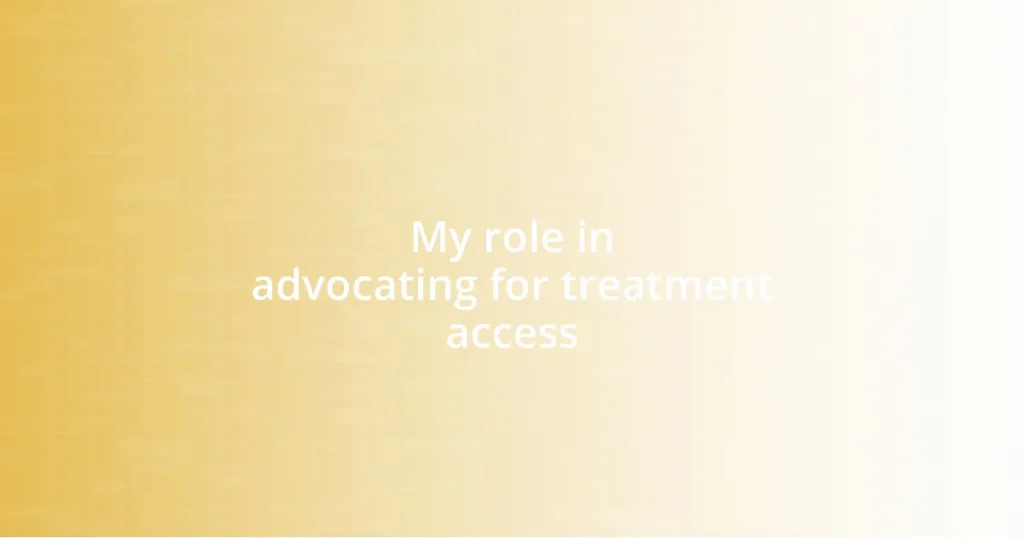Key takeaways:
- Prioritizing prevention—through regular check-ups and healthy lifestyle choices—significantly improves overall wellness.
- Identifying potential health risks involves understanding family medical history, lifestyle habits, and environmental factors.
- Choosing a healthcare provider who emphasizes preventive care and aligns with personal values is essential for effective health management.
- Creating a flexible personal health plan helps maintain accountability and adapt to life’s changes, enhancing overall well-being.
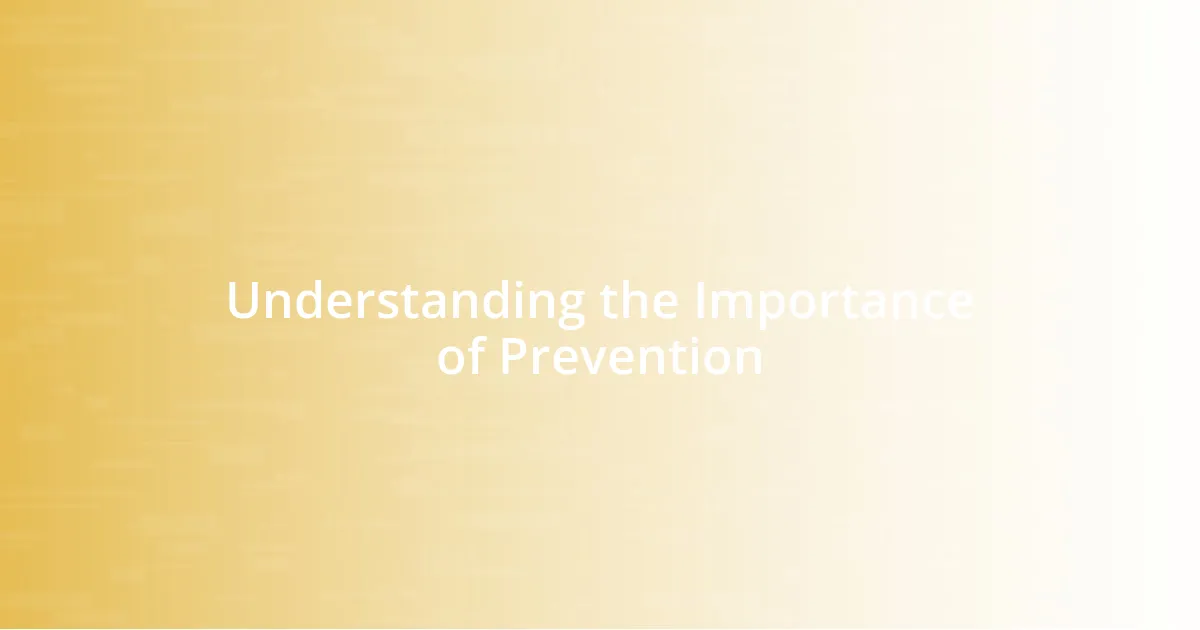
Understanding the Importance of Prevention
Prevention is often seen as a buzzword, but in my experience, it’s truly the foundation of good health. I can’t help but think about the time I prioritized regular check-ups and screenings—those simple appointments have had a profound impact on my overall wellness. Was it just a coincidence that I caught a potential issue early on? I think not.
Reflecting on my journey, I’ve come to realize that prevention isn’t just about avoiding illness; it’s about embracing a healthier lifestyle. I vividly remember the moment I switched to healthier eating habits and noticed my energy levels soar. How amazing is it that a few thoughtful choices can transform how I feel day-to-day?
Moreover, I often wonder how many people overlook prevention due to busy schedules or the belief that they’re invincible. I’ve been there—balancing work and family can feel overwhelming. Yet, I believe that investing even a little time in preventive measures can yield significant rewards in the long run. In my case, those small steps have made all the difference.
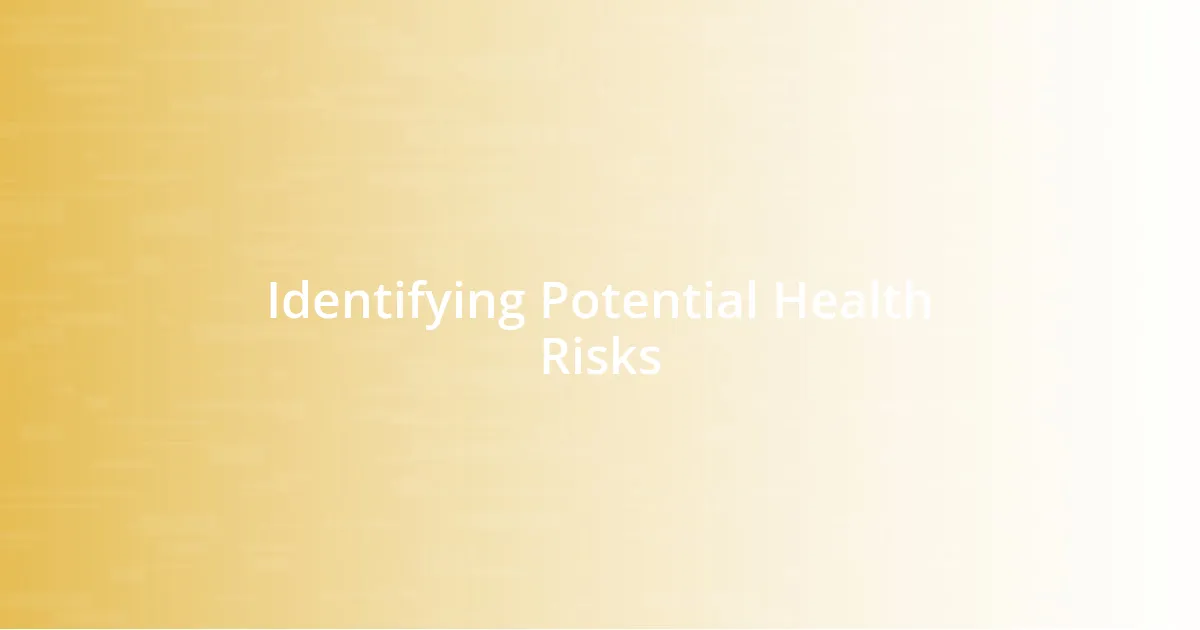
Identifying Potential Health Risks
Identifying potential health risks is often the first step in my journey toward better health. I remember sitting in a doctor’s office, filling out a family medical history form, only to realize that several health issues ran in my family. It hit me hard that my environment and genetics could influence what I might face. Recognizing these factors early on prompted me to engage in proactive conversations with my healthcare provider.
Here are some key aspects I’ve learned about identifying potential health risks:
- Family History: Understanding your family’s medical history can reveal risks for conditions like diabetes or heart disease.
- Lifestyle Choices: Reflecting on personal habits—like diet, exercise, and smoking—can uncover areas for improvement.
- Environmental Factors: Assessing my living conditions, such as exposure to toxins or high-stress environments, helped me see less obvious health threats.
- Regular Screenings: Committing to routine tests can catch issues before they escalate.
- Self-awareness: Staying attuned to changes in my body, like new symptoms or unexplained fatigue, encourages timely action.
With these insights actively guiding my decisions, I believe I can mitigate potential risks and embrace a more proactive approach to my health.
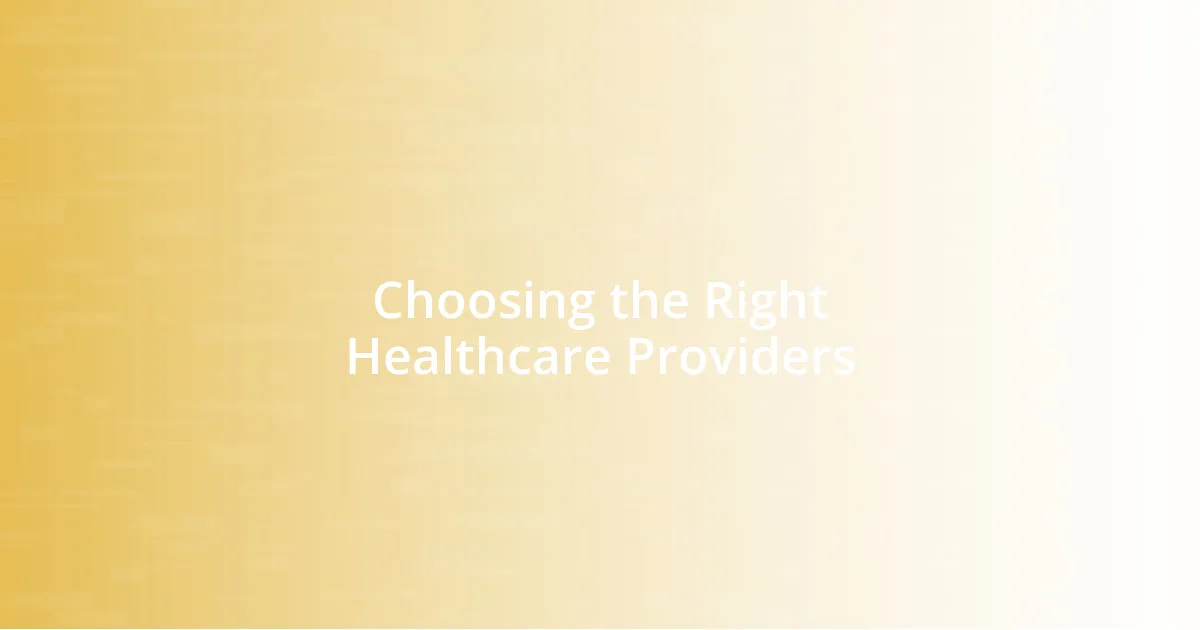
Choosing the Right Healthcare Providers
Choosing the right healthcare provider is crucial in my journey toward preventative health. I remember the moment I found my current physician: I was juggling prescriptions and needing a doctor who would truly listen. After several visits with different providers, I realized that finding someone who aligns with my values and prioritizes preventive care made all the difference.
When assessing potential healthcare providers, I look at their approach to prevention. Some focus on immediate treatments, while others, like my own doctor, emphasize long-term health and wellness. I often ask questions about their preventive services, like screenings and lifestyle guidance, to gauge their commitment. That personal touch matters; during one visit, I felt seen when my provider spent extra time discussing my dietary habits and offering tailored advice. It reinforced my belief that collaboration is key to achieving my health goals.
I also weigh practical factors, such as convenience and accessibility. For instance, I used to drive miles for appointments until I found a local clinic with excellent reviews. What a relief it was to not only have attentive care but also to eliminate the hassle of long commutes! It’s these seemingly small details that can elevate the whole experience.
| Aspect | Considerations |
|---|---|
| Communication Style | Does the provider listen actively and engage in open dialogue? |
| Preventive Focus | Are preventive measures prioritized in their practice? |
| Location | Is the provider easily accessible to me? |
| Personal Connection | Do I feel comfortable and understood during appointments? |
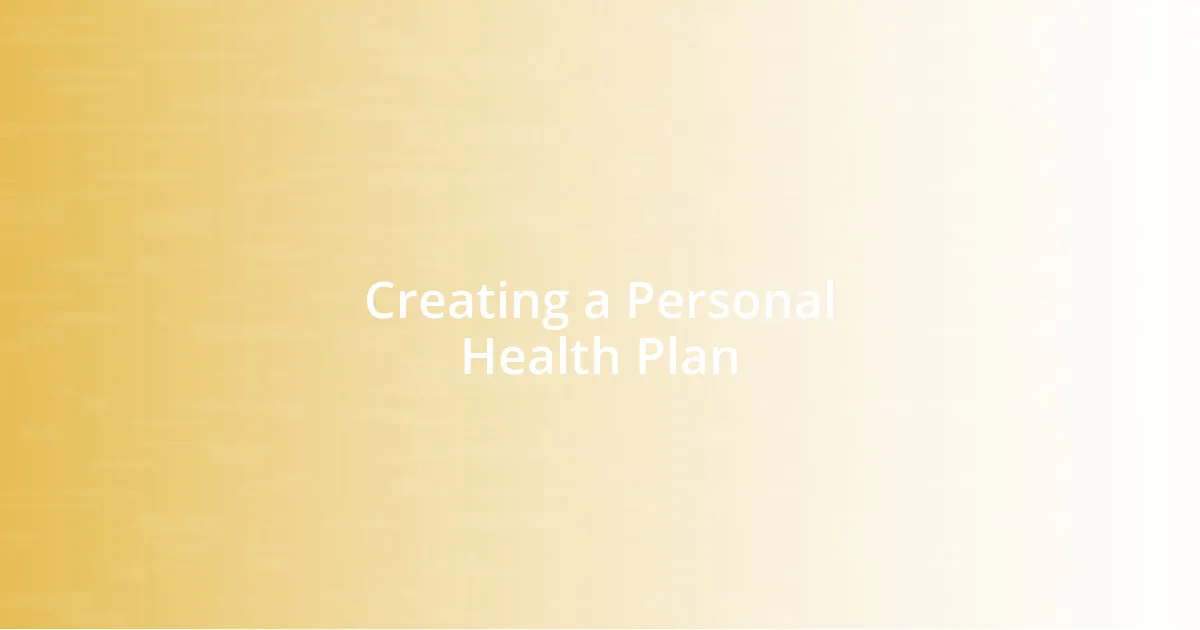
Creating a Personal Health Plan
Creating a personal health plan is an empowering step I’ve taken to address my unique needs and goals. I vividly recall drafting my first plan after a health workshop. It felt therapeutic to write down my aspirations—like managing stress through mindfulness or committing to a regular exercise routine. This process wasn’t just about ticking boxes; it was a personal accountability tool that kept me motivated and focused.
As I refined my plan, I discovered the importance of setting realistic goals. For instance, rather than saying I would “eat healthier,” I specified that I would incorporate three servings of veggies into my meals each day. Setting achievable targets made it easier to stay on track. Have you ever tried to radically change your habits overnight? I certainly have, and it’s exhausting! Gradual changes lead to lasting results, and that’s the approach I stand by.
Lastly, I realized that a personal health plan should be flexible. Life gets busy, and routines can shift. During a particularly hectic month, I adjusted my exercise schedule to include short home workouts instead of my usual gym sessions. I learned it’s not about perfection but about progress. How do you adapt to life’s challenges while prioritizing your health? Embracing adaptability has been a game-changer for me, allowing my plan to evolve without losing sight of my health goals.
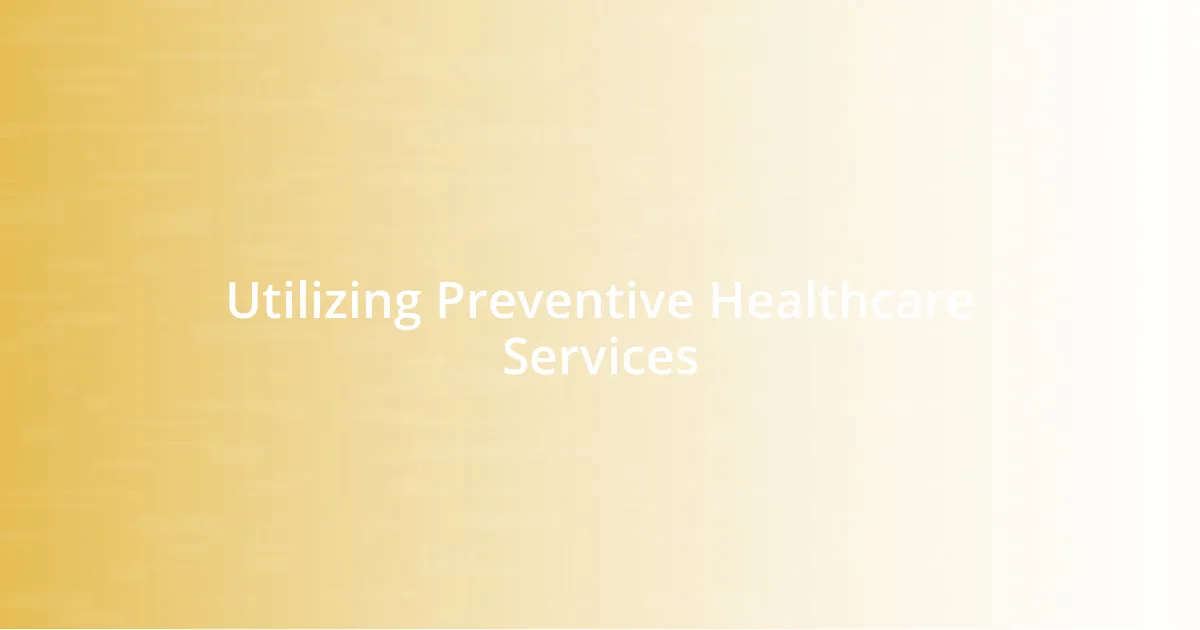
Utilizing Preventive Healthcare Services
Utilizing preventive healthcare services has been pivotal in my own health journey. I remember the first time I participated in a wellness screening; I was a bit nervous but curious about what they would find. That experience opened my eyes to how essential these services are—not just to catch problems early but to understand my body’s needs on a deeper level. Have you ever considered how a simple screening could change your perspective on your health?
Engaging with preventive services often involves more than just the standard check-ups. When I discovered the benefits of nutrition counseling, I was blown away. Sitting down with a registered dietitian, I felt like I had a partner in my health—someone who could tailor advice specifically for me. Suddenly, dietary changes that felt overwhelming became manageable and enjoyable. By exploring these resources, I learned that preventive care isn’t just about avoiding illness; it’s about actively enhancing my quality of life.
I find value in building a proactive health routine that integrates preventive services into my life. For instance, I now schedule annual appointments for screenings but also include regular mental health check-ins, which are often overlooked. Reflecting on my experiences, I ask myself: how often do we dismiss the importance of mental wellness? Tackling these aspects of health together has not only been enriching but has also given me a genuine sense of empowerment. By leveraging every available resource, I feel more equipped to steer my health in the right direction.
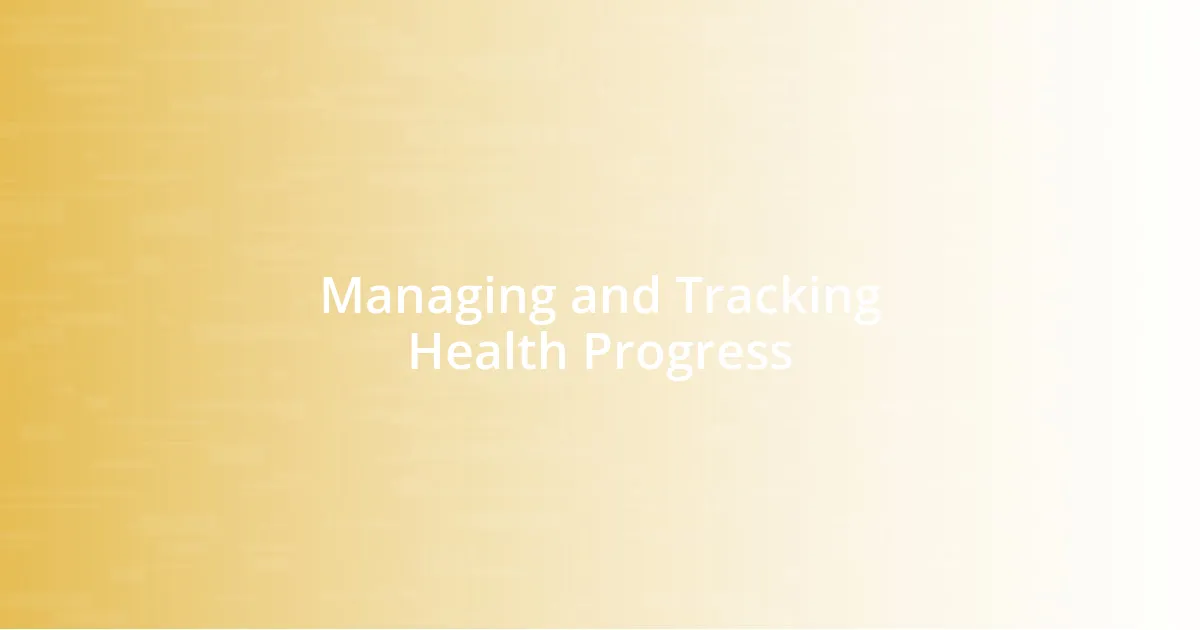
Managing and Tracking Health Progress
Tracking my health progress has been a game changer, allowing me to visualize my journey toward wellness. I remember when I first downloaded a health tracking app—it felt like having a personal coach in my pocket. Every time I logged my workouts or meals, I could see my efforts accumulate, which motivated me to keep going. Have you ever felt that rush when you hit a milestone? For me, checking off my daily goals became a ritual that ignited a sense of accomplishment.
One method I’ve particularly enjoyed is using a simple journal to reflect on my health journey. Writing down not just what I achieved, but how I felt during that progress has created a deeper connection to my experiences. There were days when I felt sluggish and defeated, and documenting those moments helped me embrace my ups and downs. It’s a reminder that health isn’t linear. Have you ever noticed how journaling can turn an overwhelming experience into manageable insights? Simply capturing my thoughts opened up a dialogue with myself about what truly matters, leading to adjustments in my routine that felt right for me.
Another crucial aspect has been sharing my progress with friends and family. I decided to create a small support group where we share our goals and victories. The accountability has been incredible; just knowing someone else is cheering me on makes challenges feel lighter. I recall one time when I struggled to stick to my workout plan, but a friend’s encouragement to join her for a morning run reignited my motivation. Isn’t it amazing how community can elevate your personal journey? Collaborating on health goals has not only strengthened my commitments but also enriched my relationships.
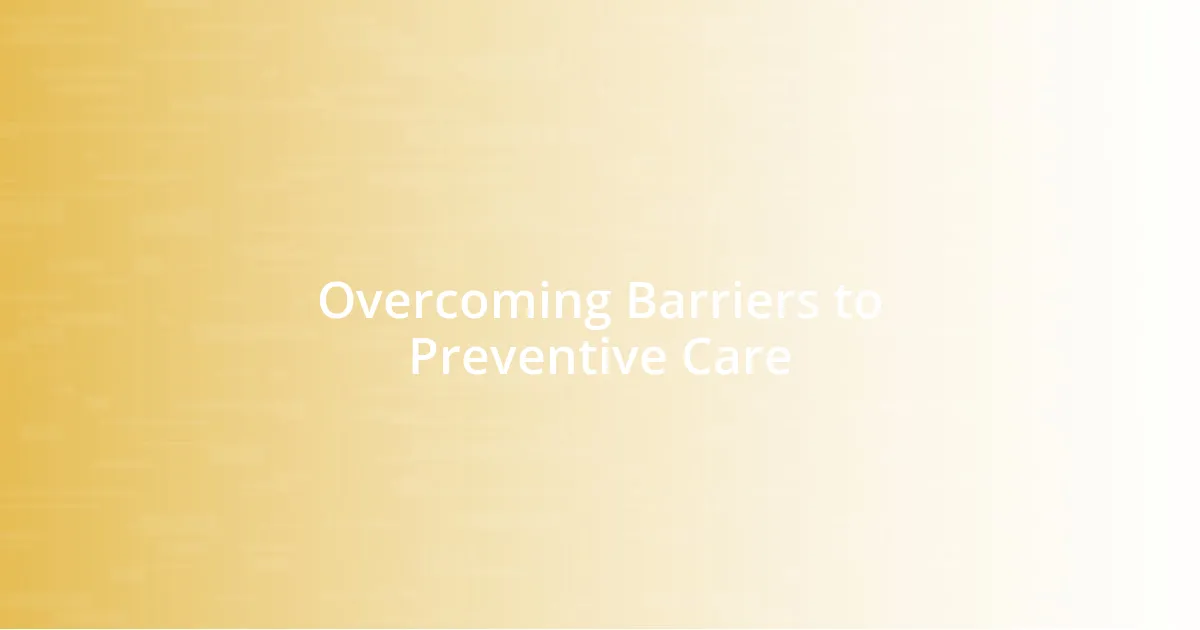
Overcoming Barriers to Preventive Care
Overcoming barriers to preventive care often requires some creative problem-solving and persistence. For instance, I faced scheduling challenges due to my hectic work life. At one point, I had to wrestle with the guilt of taking time off for health screenings, worrying that my boss would see it as a lack of commitment. That’s when I decided to block off time on my calendar as if it were an important meeting—because, honestly, my health is just as crucial. Have you ever felt like prioritizing yourself was a bit selfish? I’ve learned it isn’t; it’s necessary.
Access to care can also be a significant hurdle. I remember feeling overwhelmed when I relocated and had to find new providers. The anxiety of starting over led me to spend hours sifting through online reviews and asking friends for recommendations. This experience taught me that building a healthcare support system is vital. By actively engaging with my network and embracing telehealth options, I could navigate through this maze more smoothly. Have you ever realized how tech can bridge the gap between you and your healthcare needs in a way that feels more accessible?
Finally, I discovered that tackling financial concerns around preventive care was instrumental in my journey. Initially, I hesitated to get certain screenings, fearing the costs. It was a family member who encouraged me to look into my insurance benefits more closely—turns out, many services were covered under preventive care without a copay. This eye-opening moment made me wonder: how many other hidden benefits might we overlook? By advocating for my health and taking the time to investigate my options, I learned that financial understanding can be a game changer in accessing vital care.

